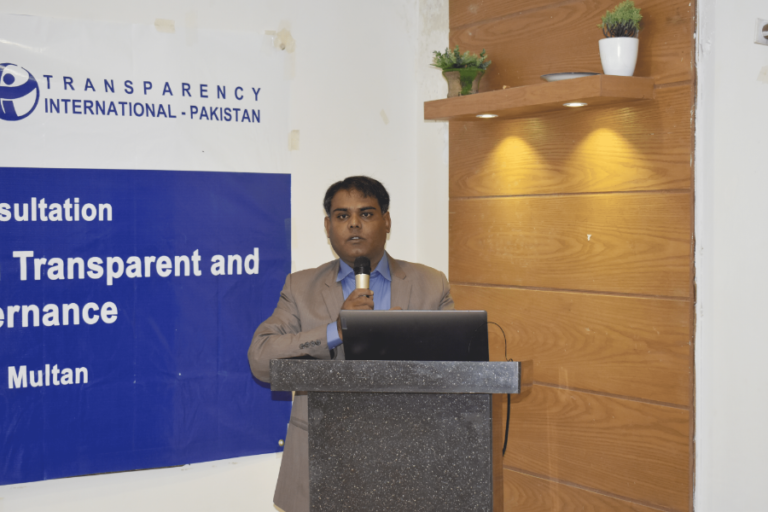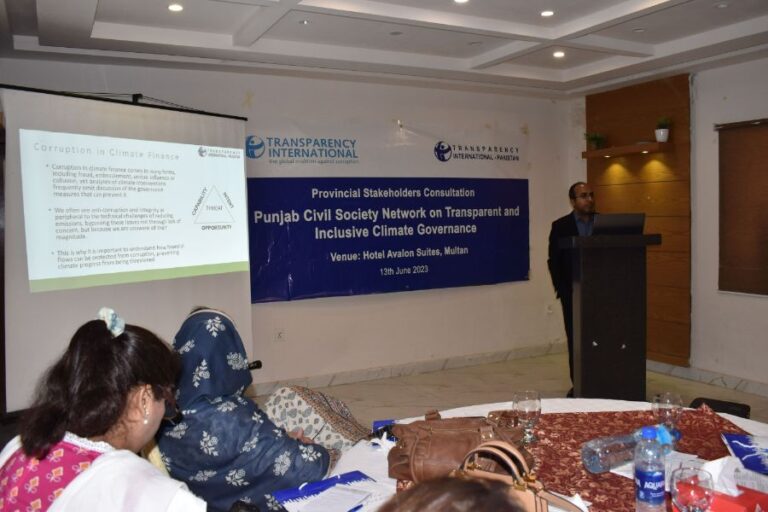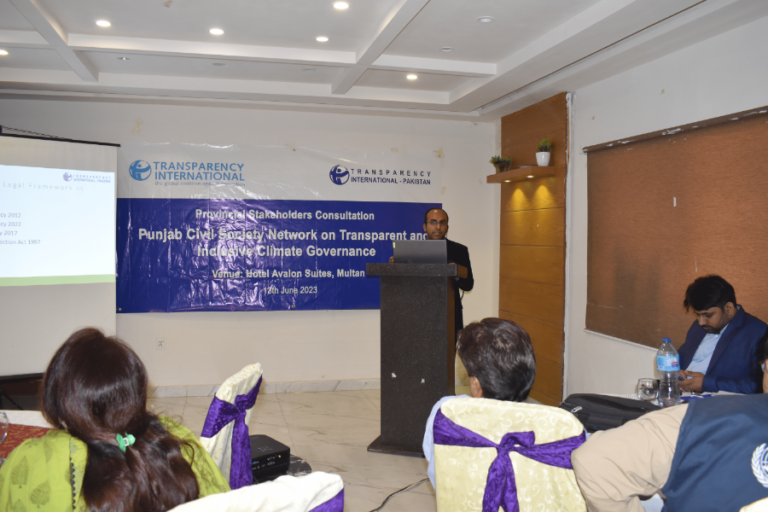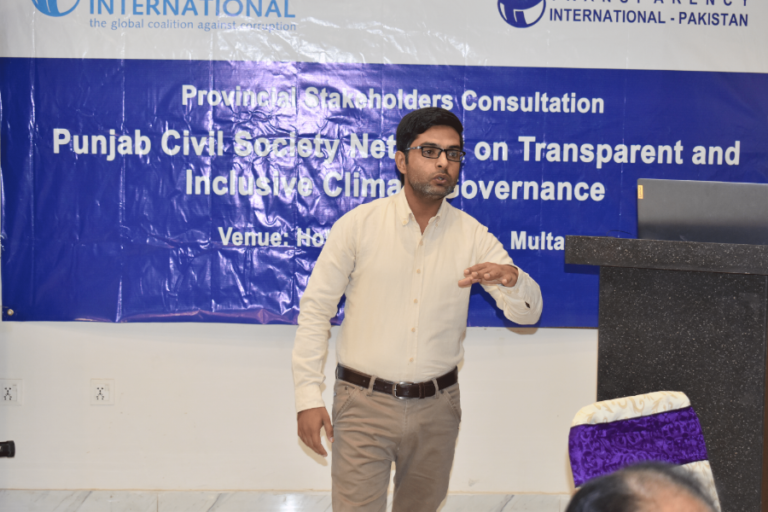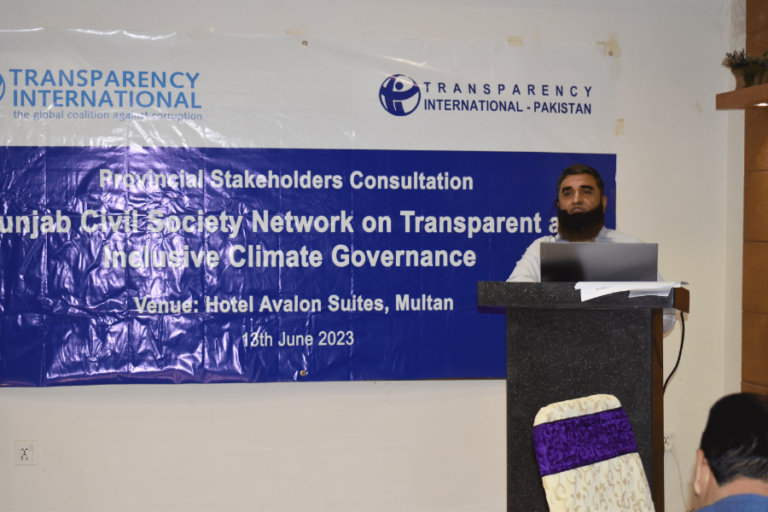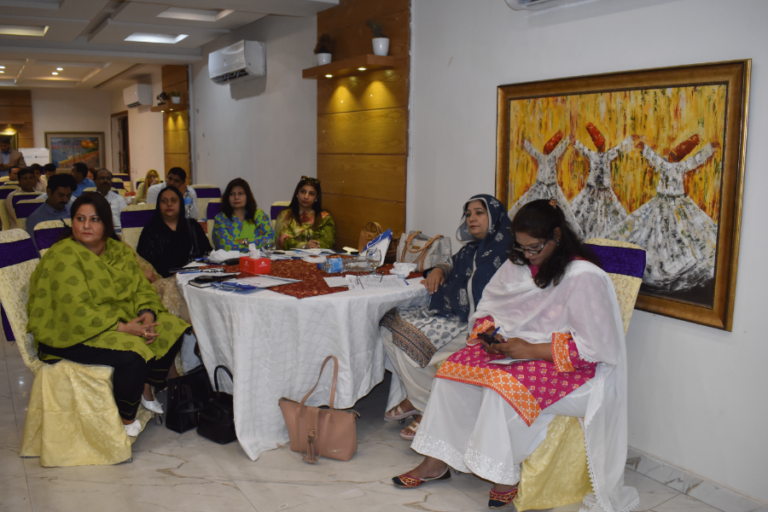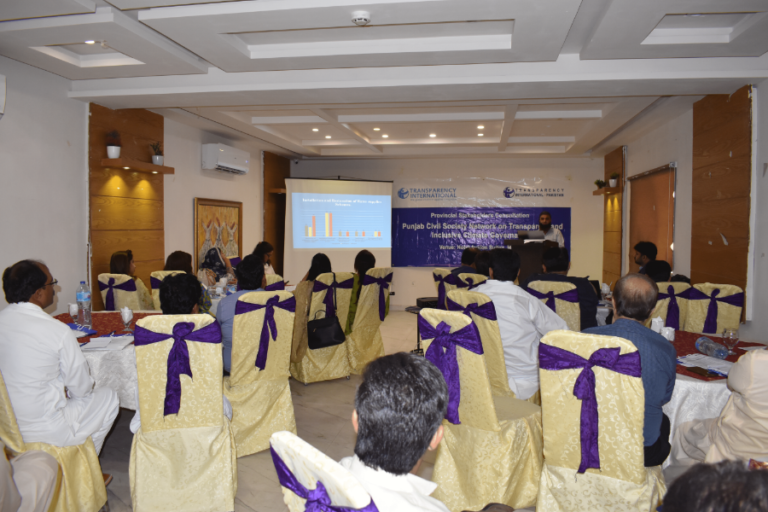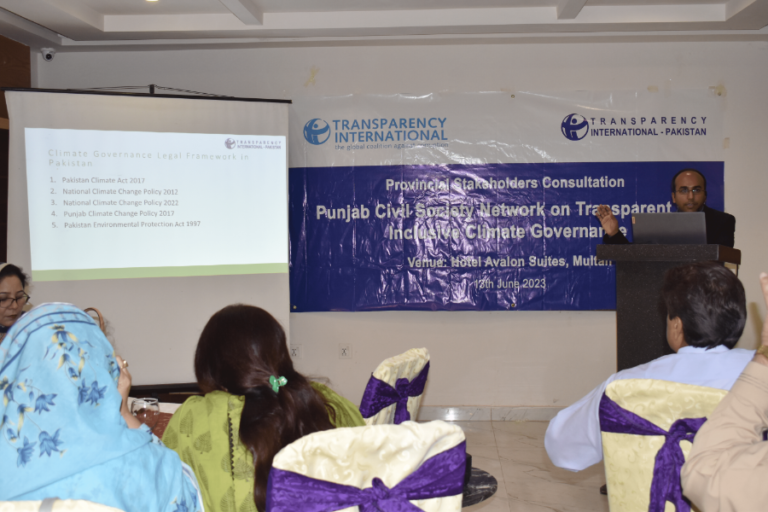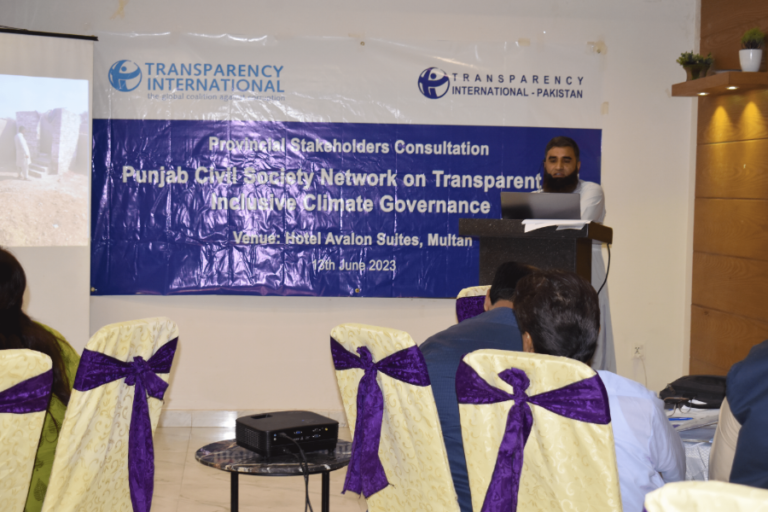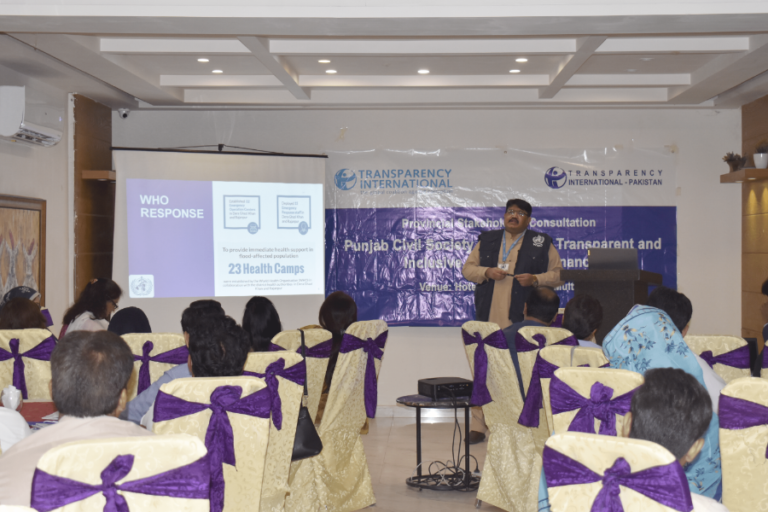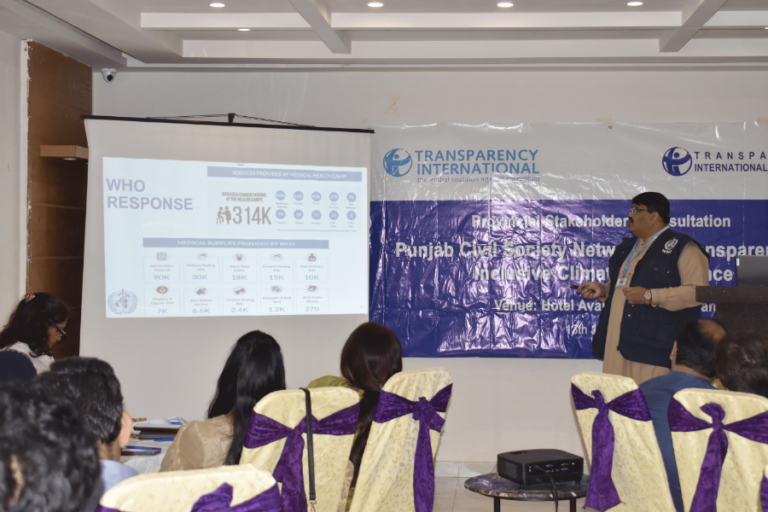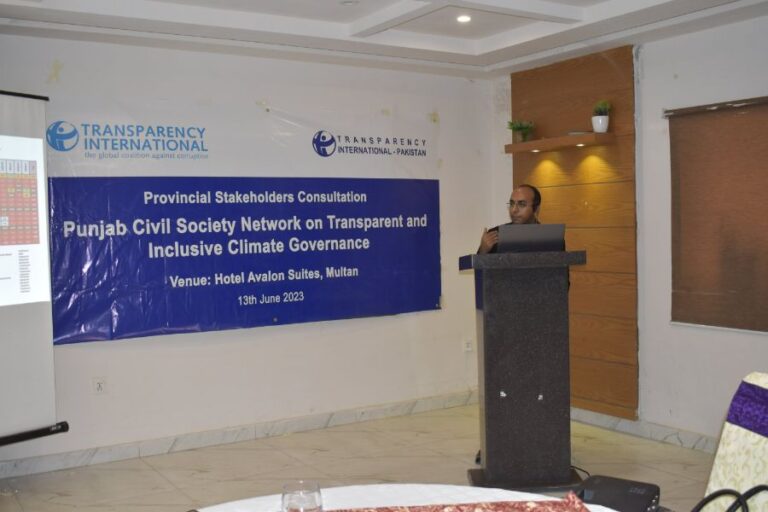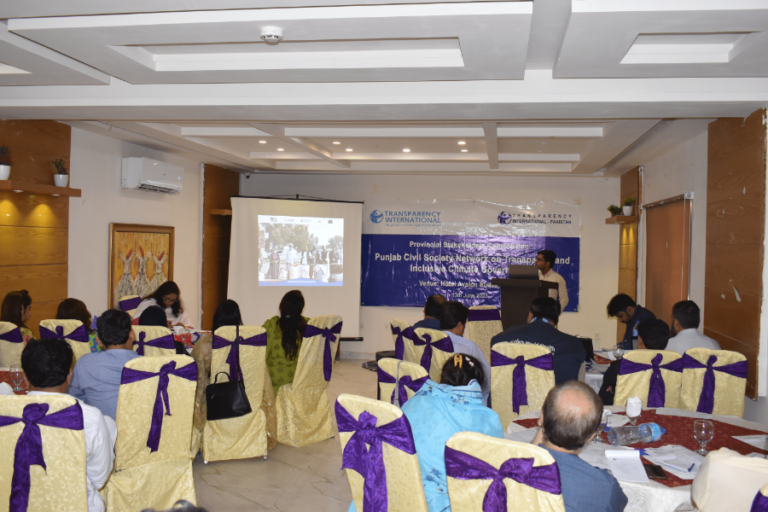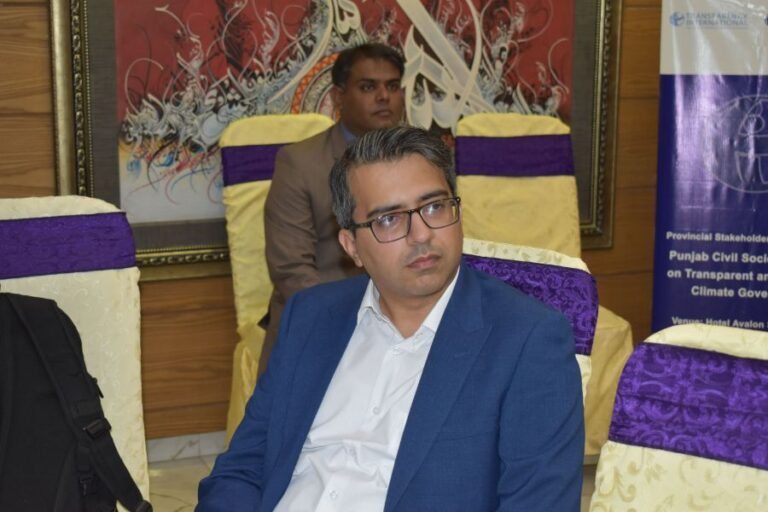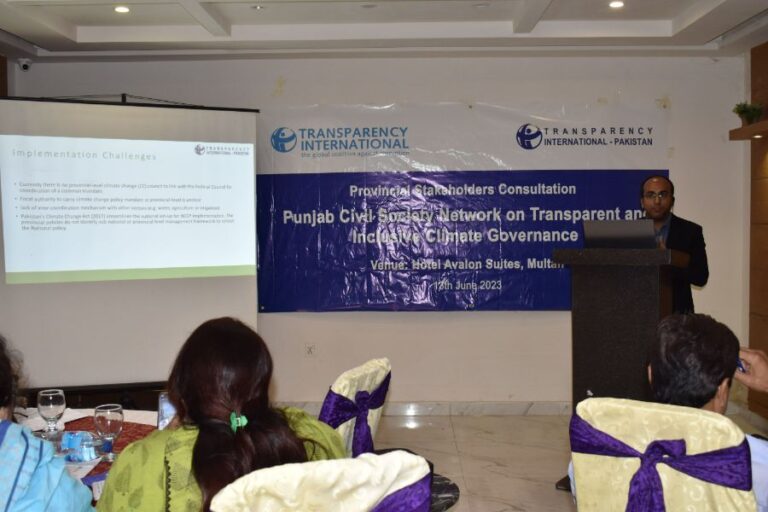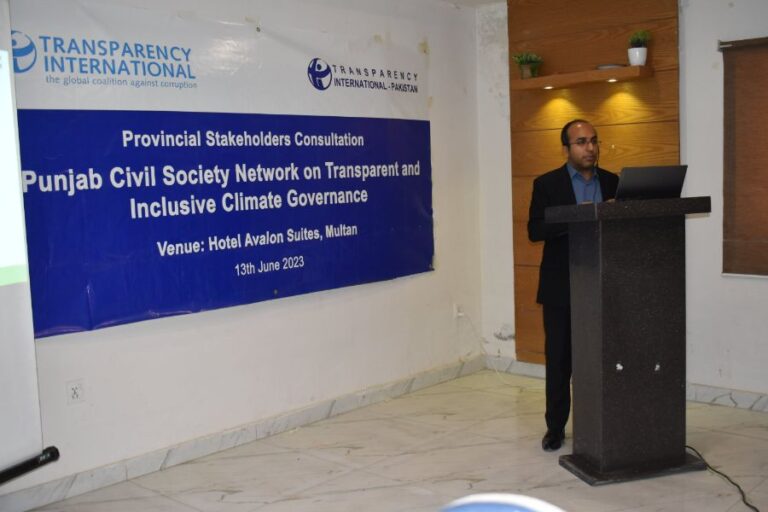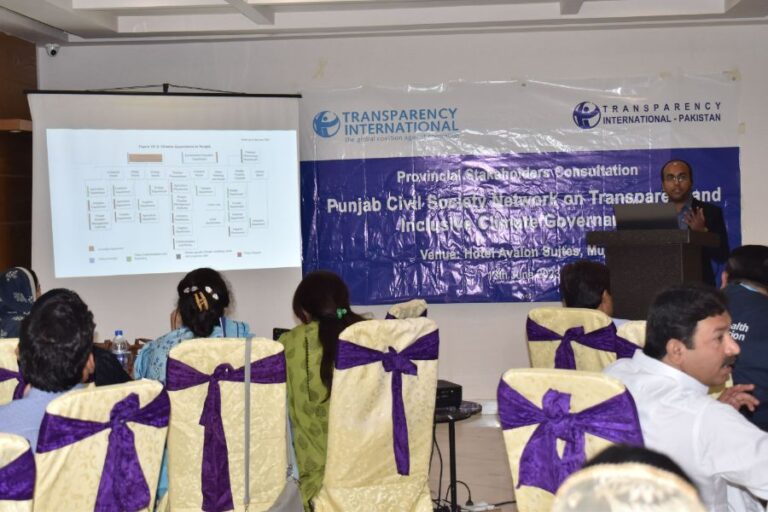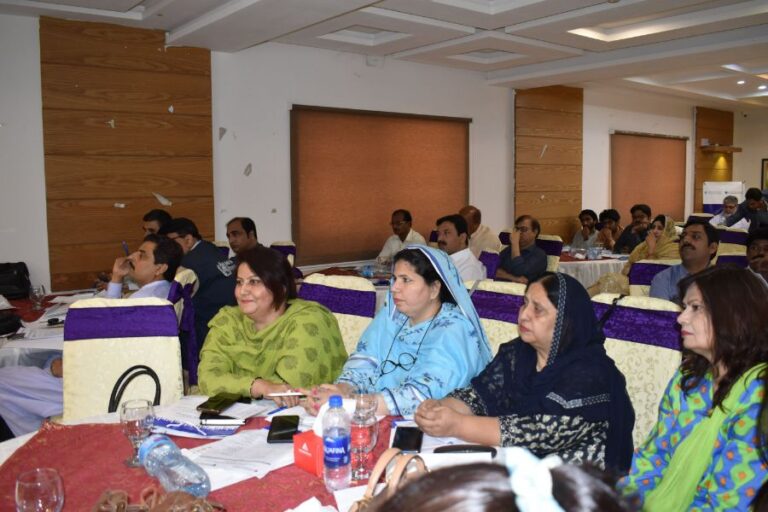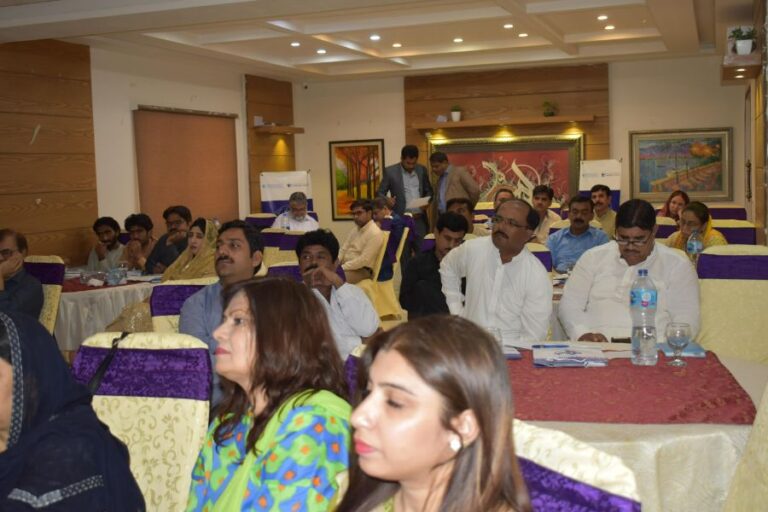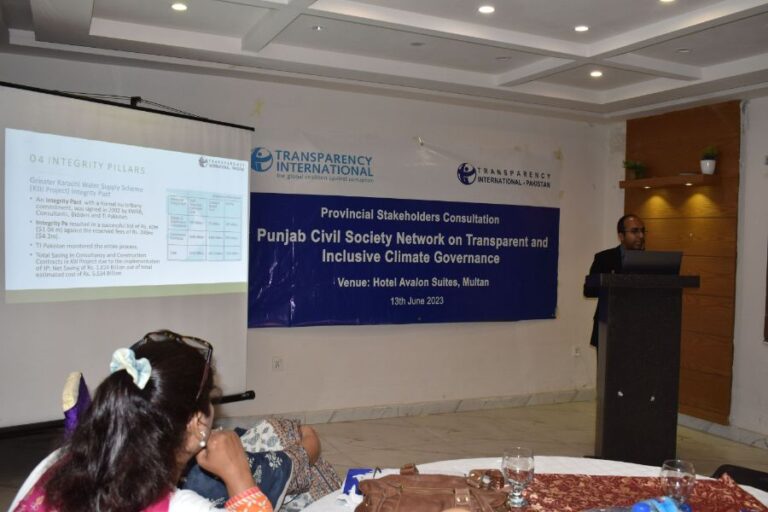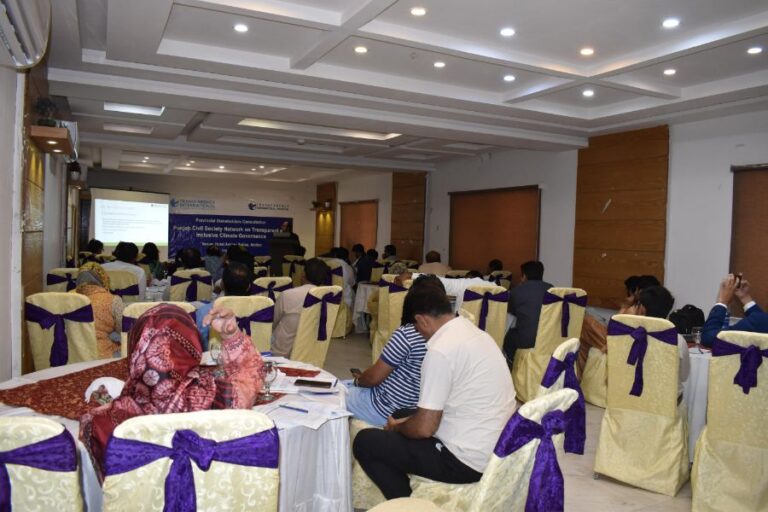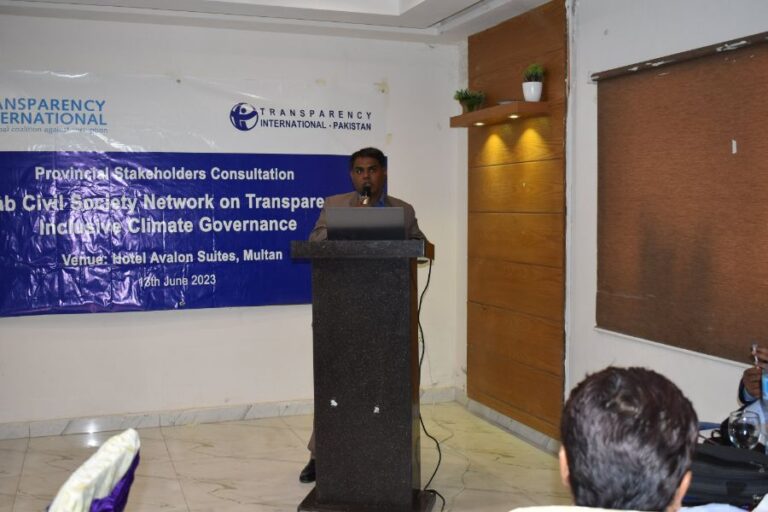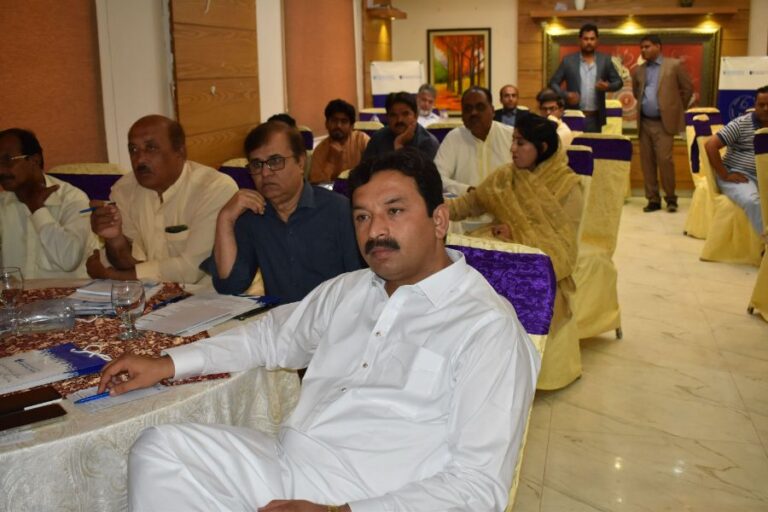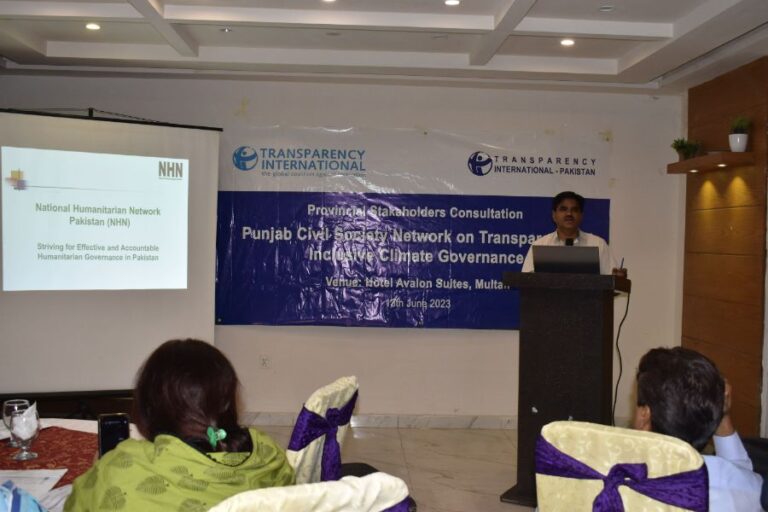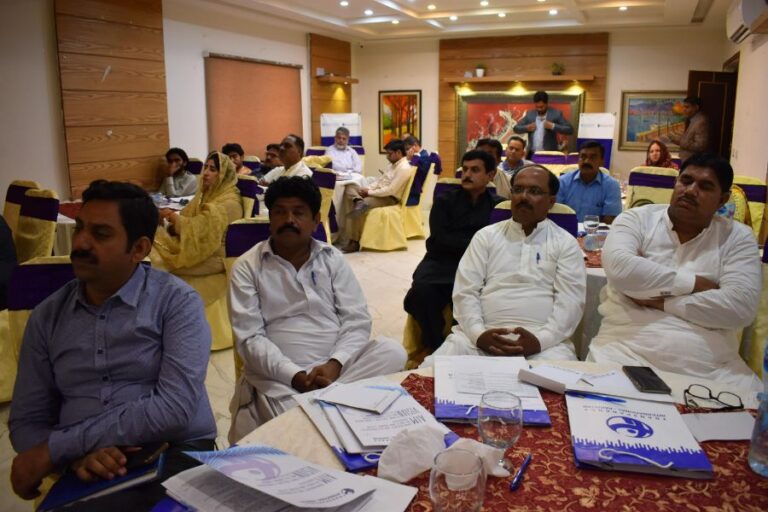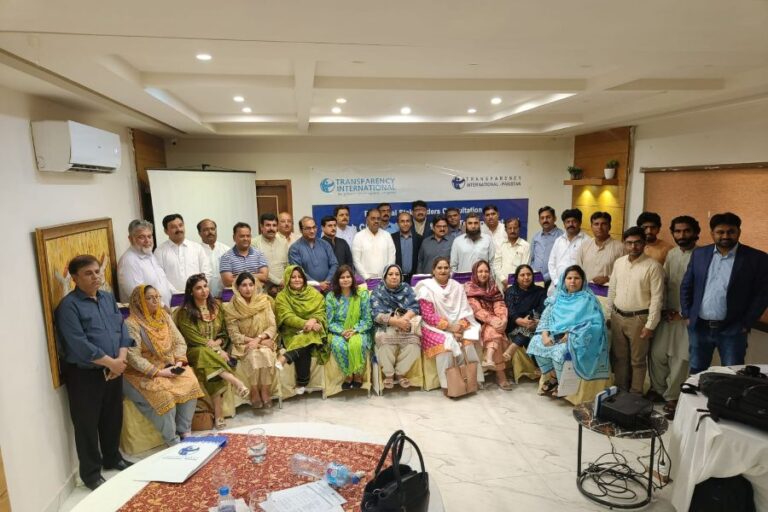- Home
- Inaugural Meeting: Provincial Stakeholders Consultation
Inaugural Meeting: Provincial Stakeholders Consultation
Inaugural Meeting: Provincial Stakeholders Consultation (Punjab Civil Society Network on Transparent and Inclusive Governance)
Venue: Hotel Avalon Suites, Multan, Punjab
Date: 13th June 2023
Event Summary: Transparency International Pakistan organized Inaugural Stakeholders’ consultative workshop/meeting and established Punjab Civil Society Network on Transparent & Inclusive Governance on 13th June 2023 at Hotel Avalon Suits Multan, Punjab. Around 40 participants representing Civil Society Organizations (CSOs) working on climate change related issues from districts Rajanpur, Rahim Yar Khan, Muzaffargarh, Kot Adu, Layyah, Lodhran, Bahawlapur, Bahawalnagar, Multan, Dera Ghazi Khan, Bakhar, Vehari, Khanewal, Kasur, Jhang, Toba Tek Singh, Nankana Sahab and Lahore attended the consultation meeting. Representatives of UN agencies from UNICEF, WHO and FAO also took part in the meeting and provided valuable insights regarding the existing policy, procedural, and legislative gaps, as well as identified issues for enhancing inclusion and integrity practices in climate governance framework in Punjab province.
The event formally began with the recitation of the Holy Quran. A round of introduction was held after which Mr. Toufique Wassan, Project Coordinator Climate Governance and Integrity Programme Pakistan (CGIP) shared the objectives of the consultative meeting.
Afterwards, Mr. Kashif Ali Shaikh, Acting Executive Director, Transparency International Pakistan delivered opening remarks. He introduced the work of Transparency International and highlighted the situation of climate change and importance of working together with Civil Society Organizations, Youth and Marginalized communities through Provincial Networks.
Moving on, Mr. Toufique Wassan, Project Coordinator, TI Pakistan gave a detailed presentation on the TORs for Punjab Civil Society Network on Transparent & Inclusive Climate Governance, He briefed the participants that TI Pakistan will engage the CSOs working in different districts of Punjab through this network and will reach out to the policy experts, public representatives and marginalized communities to advocate for inclusive climate policies and transparent climate action through the following:
- Stakeholder Engagement at grassroot level to participate in Policy Making process
- To monitor the progress and transparency in development work at calamity hit areas
- To report the corrupt practices during emergencies and coordinate with relevant authorities to take notice and action.
Next, Mr. Muhammad Tufail Khan, Emergency Specialist UNICEF Multan Hub gave a detailed presentation on UNICEF Emergency Response during Flood Situation 2022. He briefed the participants about UNICEF initiatives to rehabilitate the flood affected population. He shared UNICEF works with Partner Organizations in Punjab and implement its interventions in strict compliance with UN policies and Procurement Rules. As of now UNICEF have been engaged to provide wash facilities (Communal Hand pumps, Moveable water filtration plants, Communal Toilets and Provision of Mosquito Kits) with strong accountability mechanisms and monitoring to avoid any abuse or wastage of its funds.
Next speaker was Dr. Mufakir Mian; Representative World Health Organization (WHO) Punjab who gave a detailed overview of WHO work during flood emergency response 2022. He shared that WHO organized 23 health camps to give immediate health support to the flood affected communities, he further shared that due to flood situation 5 Health Facilities were severely damaged and 32 health facilities were partially damaged. WHO rehabilitated the affected health units in compliance with UN Rules and Procurement Policies and restored the service delivery to the marginalized communities. He further explained that WHO is working closely with the District Administrations, Health Department, and other relevant stakeholders to mitigate the effects of 2022 floods.
Moving forward, Mr. Muhammad Nasir, Representative Food and Agriculture Organization (FAO) shared that FAO is working with farmers and extremely vulnerable groups in the flood affected areas of South Punjab and providing crop inputs and livestock feed, vaccination & shelter support. He briefed the participants about FAO’s web-based management information system and accountability mechanisms to ensure transparency in the provision of emergency assistance to the deserving communities.
The presentations were followed by tea break.
Afterwards, Mr. Kashif Ali Shaikh, Acting Executive Director TI Pakistan gave detailed presentation on the Climate Governance Legal Framework in Pakistan, he discussed the Pakistan Climate Act 2017, National Climate Change Policy 2012, National Climate Change Policy 2022, Punjab Climate Change Policy 2017, Pakistan Environmental Protection Act 1997 and the Establishment of Pakistan Climate Change Council which is led by the Prime Minister of Pakistan to mainstream climate change concern into decision making to create enabling conditions for integrated climate resilient process but the council but at present there is no provincial-level climate change (CC) council to link with the Federal Council for coordination of a common mandate. Other than this there is need to advocate for the approval of Provincial Climate Change Policy Drafts and implement the strategies to minimize the risks at grass root level. He further emphasized to ensure 04 Integrity Pillars for Due Diligence and Financial Integrity
- A strong financial framework can ensure climate funding is used for intended purposes, keeping monetary flows fully transparent at every level and preventing bribery, embezzlement and fraud
- Publishing all contract award information
- Internal oversight mechanisms
- Social audits
Next, Mr. Sultan Mehmood Provincial Coordinator, National Humanitarian Network Punjab briefed the NHN Punjab chapters’ efforts to mobilize the donor agencies to work in Punjab particularly in the Calamity hit districts to reduce the vulnerabilities of affected communities. He briefed that NHN is working at National level through its Provincial chapters and trying to facilitate the policy makers in the development of National Policy Guidelines on Vulnerable Groups in Disasters, Country Humanitarian Strategic Plan and Monsoon Contingency plans to reduce the vulnerabilities of marginalized communities and contribute to reduce corrupt practices during emergency situations.
Next, Mr. Amer Ejaz Technical Advisor Civic Path for Development (CPD) shared detailed presentation on budgetary allocations on Climate resilience projects at National and Provincial Level. He briefed the participants about the allocations of 5 consecutive years and percentages of fiscal allocations on Climate Change and priorities of National and Provincial Governments to reduce the risks at grass root level. He highlighted that the allocations at national level on climate change are less than 1% of total fiscal development budget in the years 2018-19 & 2019-20 and it’s less than 2% of total fiscal development budget 2020-21, 2021-22 & 2022-23 which shows that climate change issues are not considered as high priority. He further discussed that if Government of Pakistan utilizes 4 consecutive years of total fiscal budget, even they we cannot fulfill the commitments related to climate change in Sustainable Development Goals (SDGs) vision 2030. He emphasized that for every $1 not spent on climate change, we will pay a cost $12-13 in the shape of rehabilitation phase.
Towards the end, a roundtable discussion with the participants from different civil society organizations was held where they shared the recommendations to improve the Draft Punjab Climate Change Policy 2017
At the end, Mr. Tofique Wassan, Project Coordinator TI Pakistan gave concluding remarks and appreciated the Civil Society Organizations for joining and sharing their valuable inputs to towards improving provincial climate governance framework in Punjab.


